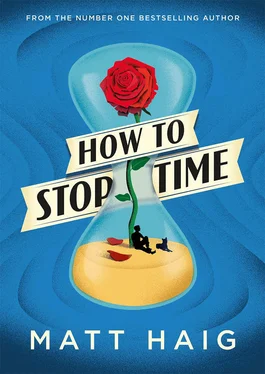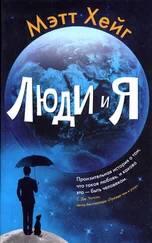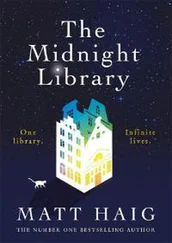Мэтт Хейг - How to Stop Time
Здесь есть возможность читать онлайн «Мэтт Хейг - How to Stop Time» весь текст электронной книги совершенно бесплатно (целиком полную версию без сокращений). В некоторых случаях можно слушать аудио, скачать через торрент в формате fb2 и присутствует краткое содержание. Год выпуска: 2017, Издательство: Canongate Books, Жанр: Современная проза, на английском языке. Описание произведения, (предисловие) а так же отзывы посетителей доступны на портале библиотеки ЛибКат.
- Название:How to Stop Time
- Автор:
- Издательство:Canongate Books
- Жанр:
- Год:2017
- ISBN:нет данных
- Рейтинг книги:4 / 5. Голосов: 2
-
Избранное:Добавить в избранное
- Отзывы:
-
Ваша оценка:
- 80
- 1
- 2
- 3
- 4
- 5
How to Stop Time: краткое содержание, описание и аннотация
Предлагаем к чтению аннотацию, описание, краткое содержание или предисловие (зависит от того, что написал сам автор книги «How to Stop Time»). Если вы не нашли необходимую информацию о книге — напишите в комментариях, мы постараемся отыскать её.
How to Stop Time — читать онлайн бесплатно полную книгу (весь текст) целиком
Ниже представлен текст книги, разбитый по страницам. Система сохранения места последней прочитанной страницы, позволяет с удобством читать онлайн бесплатно книгу «How to Stop Time», без необходимости каждый раз заново искать на чём Вы остановились. Поставьте закладку, и сможете в любой момент перейти на страницу, на которой закончили чтение.
Интервал:
Закладка:
‘I have skills, good sirs, that might be wanting elsewhere.’
‘Like what?’ asked Mr Furneaux.
I dug deep into my bag and took out my black wooden three-holed galoubet and put it to my lips. I began to play a few notes of a folk tune, ‘The Bay of Biscay’.
‘You play the pipe well,’ said Mr Furneaux, suppressing a smile.
‘I can also play the mandolin.’ I didn’t mention the lute, obviously. It would have been like, these days, saying you could use a fax machine in a job interview. It simply wasn’t something people did any more.
Mr Furneaux was impressed, and said something along those lines.
‘Hmm,’ said Mr Wallis, humming a more doubtful tune and turning to his companion. ‘We are not arranging a concert, Mr Furneaux.’
Mr Furneaux inhaled the damp air sharply. ‘If I may be so bold, Mr Wallis, I would like to proffer that musical ability is an invaluable skill on long voyages such as ours . ’
‘I have other skills too, sir,’ I said, addressing Mr Wallis.
He gave me a quizzical look.
‘I can hook a sail and oil the masts and repair the rigging. I can read both words and maps. I can load a gun with powder, and fire it with reasonable aim. I can speak in the French tongue, sir. And the Dutch, though with less proficiency. I am sound on a night watch. I could go on, sir.’
Mr Furneaux was suppressing a laugh by now. Captain Wallis looked no happier than he had a minute before. In fact, he looked like he seriously didn’t like me now. He began walking away, his velvet coat flapping in the breeze like the sail of a retreating ship.
‘We sail early. Six of the clock, tomorrow morning. We’ll see you harbourside.’
‘Aye, sir, six of the clock. I’ll be there. Thank you. Thank you very much.’
London, now
I am teaching more social history to the class of year nines when Camille walks past the window, like a tormenting dream.
‘In Elizabethan England, no one carried bank notes in their pocket. It was all coins until the establishment of the Bank of England . . .’
I raise my hand instinctively, but Camille doesn’t respond, even though she sees me. Anton watches as my hand falls.
It stays that way the whole week. I am invisible to Camille. Her eyes never meet mine in the staff room. She never says hello when we pass each other outside. I have hurt her. I know that. So I make no attempt to make it worse by talking to her. My plan is simply to see the week out, go to Australia, and then ask to go somewhere far away from here.
Once, though, crossing diagonal paths across the school hall, seeing her looking sad, I can’t help but say, ‘Camille, I’m sorry . . . I’m sorry.’ And she gives a nod so small it might not have been there at all, and carries on walking.
That evening, as Abraham tries to shake off a Maltese terrier a quarter of his size, I stare over at the empty bench and remember putting my arm around Camille. The bench exudes a sadness, almost as if it remembers too.
The following Saturday is the start of the half-term break. I am due to fly to Australia and drop Abraham off at the dog sitter’s the following day but right now I am in the supermarket. I am chucking a travel-size tube of toothpaste in my basket when I notice Daphne, bright-bloused and wide-eyed, behind her trolley.
I don’t want her to know I am going away, so I hide the toothpaste and a bottle of sun tan lotion under a copy of New Scientist .
‘Hey, Mr Hazard!’ she says, laughing.
‘Mrs Bello, hi!’
Unfortunately, we get talking. She says she has just seen Camille on her way to Columbia Road flower market.
Daphne’s eyes dance a little mischievously. ‘If I wasn’t your boss – which I am – if I was just your next-door neighbour – which I am not – I would say that, well, Madame Guerin has, for some crazy reason, a bit of a thing for a certain new history teacher.’
I feel the unnatural brightness of the supermarket.
‘But obviously I wouldn’t say that, because I am a headteacher and headteachers shouldn’t say that sort of thing. It would be totally unprofessional to encourage inter-staff romances. It’s just . . . she’s been very quiet this last week. Have you noticed?’
I force a smile. ‘Fake news, I’m afraid.’
‘I just thought that maybe you’re the person to cheer her up.’
‘I think I may be the last person for that job.’
There is an awkward silence. Well, it is awkward for me. I don’t think Daphne does awkward. I notice a bottle of rum lying in her trolley, next to a bag of pasta.
‘Having a party?’ I ask, trying to initiate a new topic.
She sighs. ‘I wish. No, no, the bottle of Bacardi is for my mum.’
‘She isn’t going to share it?’
‘Ha! No. Bless her. She’s quite a hog with her rum. She’s in an old folk’s home in Surbiton – her choice, she likes the company – and she always gets me to sneak in a bottle of the good stuff. She’s a bit naughty, my mum. I always feel like a bootlegger or something, like in America during Prohibition, you know . . .’
I remember playing ragtime tunes on the piano in Arizona, a bottle of moonshine on the dusty floor beside me.
‘She’s had a bit of kidney trouble and has had a stroke so she should be off the booze completely, but she always says she’s here for a good time not a long time, though she has been here for a long time, because she’s eighty-seven and she’s a right tough old bird. Ha!’
‘She sounds great.’ I try my hardest to engage in the conversation, but my painful, overactive hippocampus is now making me think of Camille at school. How pale she’d been looking. How she had deliberately placed herself at the opposite end of the staff room to me.
But then Daphne says something that snaps me out of my despair.
‘Yeah, she’s a good chick, my mum. Mind you, she’s with a right motley crew in the home. There’s one woman there who reckons she’s so old she was born in the reign of William the Conqueror! She should be in a psychiatric ward, really.’
I stop in my tracks. My first thought is Marion. This is irrational. If Marion was alive she wouldn’t look like an old person. She’d look younger than me. And she was born in the reign of King James, not William the Conqueror.
‘Poor Mary Peters. Mad as a box of frogs. Gets scared of the TV. But a lovely old dear.’
Mary Peters .
I shake my head at Daphne, even as I remember the gossip that surrounded the disappearance of the Mary Peters we knew in Hackney. The one who Rose knew at the market. Who used to get Hell-turded by Old Mrs Adams and had arrived ‘from nowhere’.
‘Oh. Oh really? Poor woman.’
When Daphne has gone I leave my trolley in the aisle and walk with brisk determination out of the supermarket. I get out my phone and start looking up train times to Surbiton.
The care home is set back from the road. There are trees crowding out the whole front of the place. I stand outside on the pavement and wonder what I should do. There is a postman on the other side of the road, but other than that – no one. I inhale. Life has a strange rhythm. It takes a while to fully be aware of this. Decades. Centuries, even. It’s not a simple rhythm. But the rhythm is there. The tempo shifts and fluctuates; there are structures within structures, patterns within patterns. It’s baffling. Like when you first hear John Coltrane on the saxophone. But if you stick with it, the elements of familiarity become clear. The current rhythm is speeding up. I am approaching a crescendo. Everything is happening all at once. That is one of the patterns: when nothing is happening, nothing continues to happen, but after a while the lull becomes too much and the drums need to kick in. Something has to happen. Often that need comes from yourself. You make a phone call. You say, ‘I can’t do this life any more, I need to change.’ And one thing happens that you are in control of. And then another happens which you have no say over. Newton’s third law of motion. Actions create reactions. When things start to happen, other things start to happen. But sometimes it seems there is no explanation as to why the things are happening – why all the buses are coming along at once – why life’s moments of luck and pain arrive in clusters. All we can do is observe the pattern, the rhythm, and then live it.
Читать дальшеИнтервал:
Закладка:
Похожие книги на «How to Stop Time»
Представляем Вашему вниманию похожие книги на «How to Stop Time» списком для выбора. Мы отобрали схожую по названию и смыслу литературу в надежде предоставить читателям больше вариантов отыскать новые, интересные, ещё непрочитанные произведения.
Обсуждение, отзывы о книге «How to Stop Time» и просто собственные мнения читателей. Оставьте ваши комментарии, напишите, что Вы думаете о произведении, его смысле или главных героях. Укажите что конкретно понравилось, а что нет, и почему Вы так считаете.

![Мэтт Хейг - Влюбиться в жизнь [Как научиться жить снова, когда ты почти уничтожен депрессией]](/books/28868/mett-hejg-vlyubitsya-v-zhizn-kak-nauchitsya-zhit-sn-thumb.webp)





![Мэтт Хейг - Полночная библиотека [litres]](/books/388474/mett-hejg-polnochnaya-biblioteka-litres-thumb.webp)

![Мэтт Хейг - Клуб призрачных отцов [litres]](/books/392121/mett-hejg-klub-prizrachnyh-otcov-litres-thumb.webp)

![Мэтт Хейг - Отец Рождество и Я [litres]](/books/421076/mett-hejg-otec-rozhdestvo-i-ya-litres-thumb.webp)
